When the sun begins to dip behind the hills of Bima, the click-clack of wooden looms fills the air. Mothers sit side by side, chatting as their hands move in perfect rhythm. Children run across the dusty yard, clutching rolls of colorful thread like tiny treasures.
For many in Ntobo—a small village in West
Nusa Tenggara—this scene is no longer a picture of survival but of pride. The
soft hum of weaving that once echoed through their homes has become the
heartbeat of a new economy.
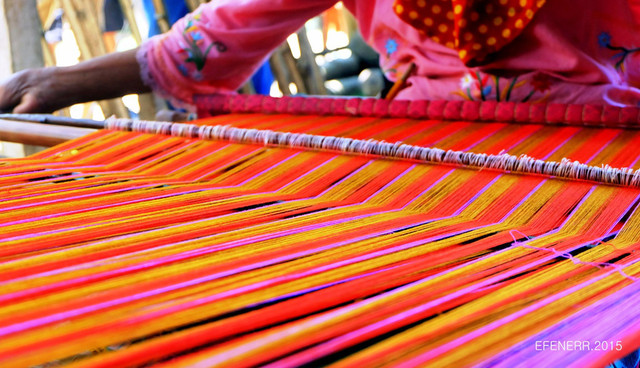 |
| The bright natural dyes give the fabric a charm of its own (Photo: efenerr) |
At the center of this quiet revolution
stands Yuyun Ahdiyanti, a mother of three whose determination turned a fading tradition
into a source of strength and recognition.
Weaving
the threads of change
Five years ago, Ntobo was struggling.
Generations of weavers had poured their hearts into Tembe Nggoli, the handwoven
sarong unique to Bima, but their art barely paid the bills. Middlemen bought
their fabrics cheaply, leaving little reward for the long hours spent at the
loom.
Yuyun, who grew up surrounded by that sound
of gedog—the rhythmic clatter of wooden looms—knew this story too well. “I
often saw mothers weaving from morning until night, but their income was so
small. Yet what they made was a work of art,” she recalled.
Her words echo the deep frustration that
once hung in the air of Ntobo: time and talent spent, but little recognition
earned.
A leap
of faith
Then came 2015—the year Yuyun decided to
change the tune. With nothing more than a smartphone, a patchy internet
connection, and a spark of courage, she began taking photos of her family’s
woven works. The bright colors, the intricate motifs, and the proud hands
behind them—all captured in simple snapshots.
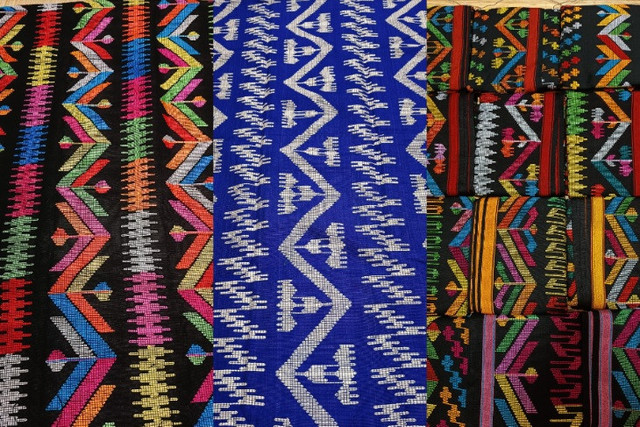
The dazzling shine and captivating motifs of Tembe Nggoli. (Photo: GNFI)
She uploaded the photos on Facebook under
the name “Yuyun Kaen Tenun Bima.” What happened next was beyond imagination.
The posts went viral.
“I was shocked,” Yuyun laughed. “Suddenly many
people wanted to order, even though I just wanted to show the mothers’ work
from our village.”
The orders started pouring in, not just
from Bima but from across Indonesia. In a world where trends come and go like
the wind, Tembe Nggoli had found its moment to shine.
The birth of UKM Dina
Sensing the tide turning, Yuyun took a leap
and founded UKM Dina, a small business that became a community movement. To
outsiders, it might look like just another weaving shop. To the women of Ntobo,
it became a second home.
“Dina is a place,” Yuyun said firmly. “A
place where we help each other and grow together.”
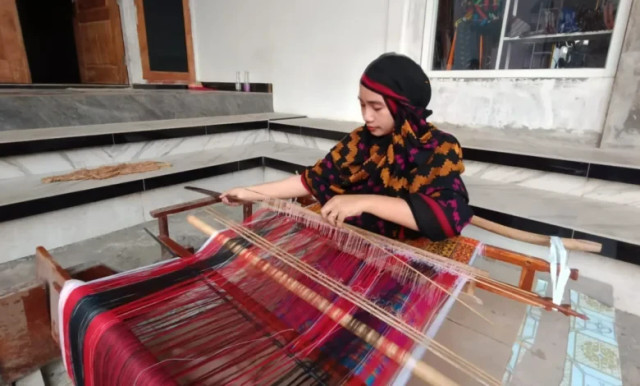
Yuyun Ahdiyanti weaving the signature cloth of Ntobo. (Photo: ntbsatu.com)
She used her first profits not for herself,
but to support fellow weavers—offering small loans, sourcing raw materials from
local producers, and helping design modern patterns that still honored their
roots. More importantly, she took over marketing, freeing the weavers from
dependence on middlemen.
“I want all weavers in our village to have
the same chance. If one moves forward, everyone does too,” she said.
Today, every large order that comes in is
shared among hundreds of weavers. Each Tembe Nggoli carries not only beauty but
also the dignity of shared labor.
From a
village craft to a digital movement
Thanks to Yuyun’s initiative, Tembe Nggoli
now travels far beyond the island of Sumbawa. UKM Dina employs over 200 weavers
and 15 tailors, with a monthly turnover of IDR 100–300 million. Its Facebook
page has more than 11,000 followers, making it one of the most active weaving
communities in the region.
For Yuyun, these figures are just numbers
on paper. The real reward lies in the smiles she sees every day. “The happiest
thing is when I see mothers smiling, able to buy new shoes for their kids from
their weaving income,” she said.
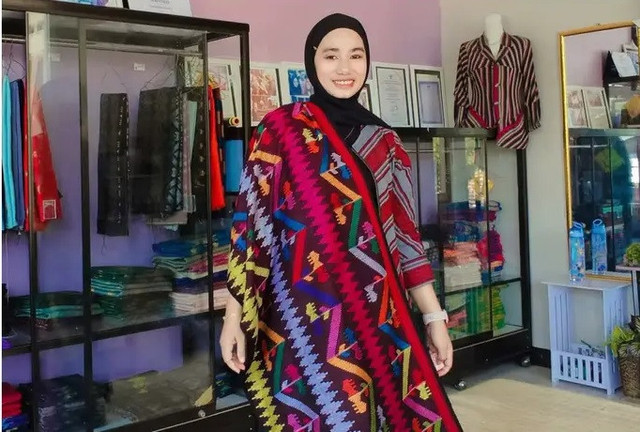
Yuyun with the handwoven fabrics produced by UKM Dina. (Photo: GNFI)
What’s even more rewarding is that the
threads of Tembe Nggoli have also reshaped the lives of women in Ntobo. Many
who once planned to migrate abroad as domestic workers now choose to stay home,
weaving their livelihoods close to family. The looms have become their
passports to independence.
Her pride extends beyond economics—it’s
cultural preservation in motion. Weaving, once seen as an “old person’s job,”
has become cool again. “Now many junior and high school students are learning.
Even a fifth-grader can finish one piece of cloth!” she said proudly.
The younger generation is now taking up the
loom not out of necessity but love—a sign that heritage, when given meaning,
can thrive in modern times.
Small
gallery, big dreams
Not far from her home stands a modest
2x6-meter gallery. From the outside, it looks simple. Inside, it’s a sanctuary
of color and pride.
Here, the soft reds from mengkudu roots,
the golden yellows from turmeric, and the calm blues from tarum leaves shine
under natural light. Every pattern—samobo, satoko, kakando—tells a story of
prayer, nature, and endurance.
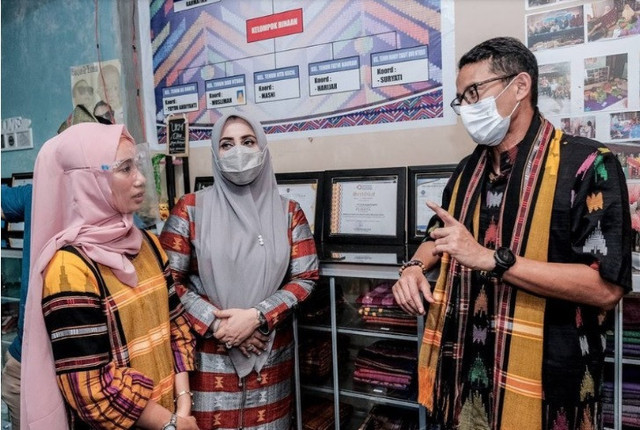 |
| Yuyun’s gallery welcomed a visit from Indonesia’s Minister of Tourism and Creative Economy, Sandiaga Uno (Photo: GNFI) |
Yuyun has turned this space into a workshop
where young people learn weaving and understand the meaning behind every
thread. She also partners with local universities to study eco-friendly dyes
using local plants. “I want our weaving to stay alive and kind to nature.
Because nature is the source of our colors,” she explained gently.
Each fabric takes around ten days to
finish, sometimes longer. But Yuyun never rushes anyone. “Each cloth needs time
and heart. That’s what makes it precious,” she said.
Recognition
woven in hard work
From those humble beginnings, Yuyun’s name
has traveled far. Her group has won multiple awards: Model Artisan Group, OVOP
(One Village One Product) Star 2, and Inspirational SME.
In 2024, she received the prestigious 15th
SATU Indonesia Award from PT Astra International for entrepreneurship—honoring
her success in uplifting her community through traditional art.
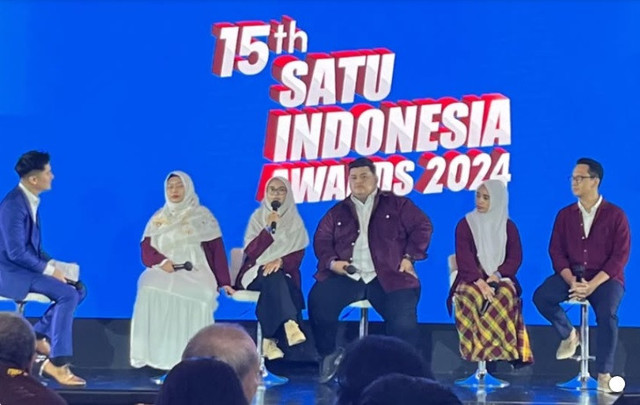
Yuyun among the winners of Astra's SATU Indonesia Awards in 2024 (Photo: GNFI)
It’s no small feat for a woman who never
went to college. As Bima’s Tourism Office head, M. Natsir, once said, “Tembe
Nggoli keeps people warm when it’s cold, and cool when it’s hot.” Its character
reflects the resilience of Ntobo’s women—strong in every season, steady as a
mountain.
Beyond the
loom
In the twilight hours, as the golden light fades
and the evening breeze whispers through the palm trees, Yuyun often sits on her
terrace watching the women work. The looms’ rhythm continues—click clack—a
steady pulse that tells the story of rebirth.
Ntobo is no longer just a name on the map.
It’s a living testament to how tradition can power transformation. What started
as restlessness became empowerment; what began as a small Facebook post became
a symbol of hope.
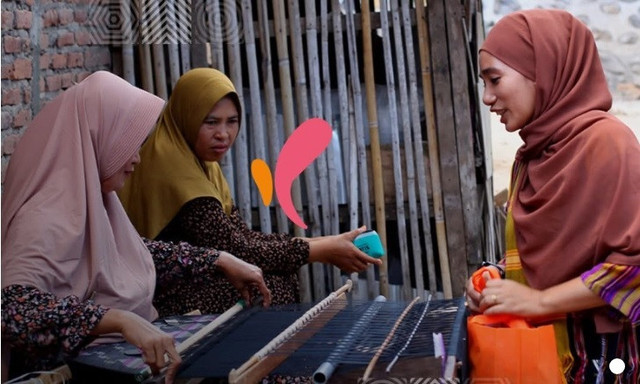
The spirit of empowerment that Yuyun continues to ignite. (Photo: GNFI)
“Weaving is not just about making cloth,”
Yuyun said softly. “It’s how we tell stories. How we survive. And how we give
thanks.”
Every Tembe Nggoli that now finds its way
to Jakarta, Sumatra, or even abroad carries more than color—it carries the soul
of a village that refused to fade away.
From Ntobo’s quiet corners, Yuyun and her
community continue to weave their dreams, thread by thread, proving that when
women rise, the whole village rises with them.
After all, as the old saying goes, “a
single thread may seem fragile, but when woven together, it can hold the weight
of the world.”
Komentar
Posting Komentar